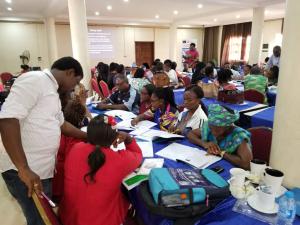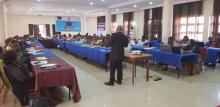Engagement of private sector stakeholders in strengthening disease surveillance and response yields results
Awka 17 July 2019 - In Anambra State, South East Nigeria, the engagement private sector health practitioners has significantly improved Integrated Disease Surveillance and Response (IDSR).
With a population of over 5million people, Anambra state has a huge private sector investment in health as over 60% of health services are provided by private health facilities (Anambra State Strategic Health Development Plan II, 2018 - 2022), however, there is weak collaboration between the private and public health sector.
To improve disease surveillance and response in the State, a multipronged approached was used. These included the involvement of the private health sector groups in key sector stakeholder’s meetings and capacity building events and provision of working tools. As a result, their response rate in implementation of policies and standards increased. Their knowledge on disease notification and response as well as data management capacity equally improved.
Expansion of disease reporting sites
The number of private health facilities generating and reporting IDSR data rose from 48 in May 2018 to 165 in December 2018. There was a significant increase in the coverage of TB services from 180 facilities in 2017 to 323 by the end of 2018 representing a 45% increase in comparison with the previous year. Overall, there was a 23% increase in TB cases detected in the state by December 2018 (2,300) compared to 1,800 detected in the previous year. This achievement is an all-time high for Anambra and occurred within a few weeks of the IDSR capacity scale up and orientation of the AGPMPN.
As the state continues to benefit from the cooperation of the private health sector, they have expressed their happiness in the new trend.
“Since the beginning of this EU funded health systems strengthening intervention in the State, the capacity for disease detection, diagnosis, case management, stock management and documentation have improved,” States Dr Joe Akabuike, Commissioner for Health in Anambra State. Stating further, “adequate engagement of the private sector especially in settings where significant proportions of health services are provided by them will contribute to advancing IDSR and health in general’’.
A case in hand was the state-wide training of 862 health care workers on IDSR where 30% of those trained were private health facilities’ staff. More interventions include: inclusion of private health facilities in Local Government Area (LGA) Integrated Health Data validation meetings across the 21 LGAs; Procurement and distribution of documentation tools to all functional health facilities including the privately owned ones; Orientation of the Association of General and Private Medical Practitioners of Nigeria (AGPMPN) among others.
Increasing access, ensuring no one is left behind
The important role of the private sector in health cannot be overemphasized in the State’s effort towards achieving UHC. Giving them a voice in sector decision making and incentivising them through capacity building, involvement in planning and implementation are key to ownership and progress.
Improvements in IDSR system in the Anambra was due majorly to the funding support from the European Union to WHO for implementing the project: ‘Strengthening the Nigerian Health System towards Achieving Universal Health Coverage’. The approach by WHO to strengthening systems was shared at the Health Data Consultative Committee meeting in March 2019 and a part the communique ratified for adoption by stakeholders for more effective private sector engagement in data management across Nigeria.
According to Nkiru Ukor, a technical officer in WHO’s Health Systems Strengthening (HSS) cluster, “this project aims at improving data analysis and information dissemination capabilities, health expenditure estimation and reduction in financial barriers to health care access. Beyond ISDR, the Health Management Information Systems (HMIS) has also significantly improved. This effort is being replicated in Sokoto State.”
With the engagement of the private sector, more numbers were recorded in terms of integrated disease surveillance. Government can indeed tap into the huge opportunity provided by the private sector in health to improve health systems and overall health outcomes.
WHO will continue supporting the government to adopt policies and programmatic actions to foster a multisectoral response for timely disease detection and response across Nigeria.




